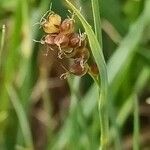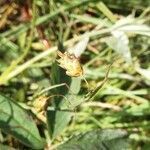Stems arising singly or few together from long, creeping rhizomes, 2–6 dm, strongly aphyllopodic; roots covered with a yellowish-brown, felty tomentum; lvs few, 1–2 mm wide, tending to be canaliculate; terminal spike staminate, 1–3 cm; pistillate spikes 1–3, nodding on slender peduncles, occasionally with a few staminate fls at the tip, 1–2.5 cm, the lowest usually subtended by a nearly or quite sheathless leafy bract 2–10 cm; pistillate scales light to dark brown, commonly about as long and wide as the perigynia, obtuse to acute or acuminate; perigynia pale, commonly greenish or stramineous, densely papillate, elliptic to ovate, somewhat compressed, 2-ribbed and with 4–7 ± evident nerves on each face, 2.3–4.2 mm, beakless or with a minute beak to 0.2 mm; achene trigonous, rather loosely enveloped by the distally empty perigynium; 2n=56, 62, 64. Sphagnum-bogs; circumboreal, s. to N.J. (and reputedly Del.), O., Io., and Calif.
Culms usually aphyllopodic, without dead leaf remains at base, 20–60 cm. Leaf blades 1–2.5 mm wide, margins involute, scabrid. Inflorescences: proximal bracts 2–6 cm, shorter than inflorescences; lateral spikes sometimes androgynous, 6–20 × 4–8 mm, with 8–30 perigynia; terminal spikes 7–35 × 1.5–2.5(–3) mm. Pistillate scales ovate to ovate-circular, 3–5.5 × 2–3.4 mm, wider and as long as or slightly longer than perigynia, apex obtuse to subacute, sometimes mucronate. Staminate scales obovate, 3–4.5 × 1.4–1.6 mm, apex obtuse, sometimes mucronate. Anthers 2–3 mm. Perigynia 2.5–4 × 1.8–2.6 mm, apex rounded; beak 0.1–0.5 mm.



